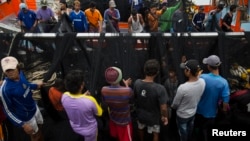Labor and anti-trafficking groups are calling for more steps to be taken to curb rights abuses in Thailand’s lucrative fishing industry, which often relies on trafficked labor from Myanmar and Cambodia. Despite the Thai Government adopts measures to correct the shortcomings, challenges remain for an industry long dependent on low cost labor.
Thailand’s reputation as the world’s third largest global exporter of fish and fishery products, worth more than $8 billion, is under threat amid ongoing charges of labor rights abuses and human trafficking, especially of foreign workers from Cambodia and Myanmar.
Up to 20 percent of workers on Thai fishing boats have faced forced labor says the United Nation’s International Labor Organization (ILO).
Widespread abuses
A coalition of rights groups centered on the seafaring and fishing industry say there are widespread abuses on vessels and the industry remains poorly governed and legislated.
The New York-based Human Rights Watch, in a report on the Thai seafood industry, says labor shortages have led to recruitment brokers targeting men from Cambodia and Myanmar - also known as Burma - and even Thailand.
Human Rights Watch deputy Asia director, Phil Robertson, says after interviews with men forced to work in the fishing industry, many pointed to regular threats of violence and abuse on board vessels.
“We continually see problems of physical abuse by captains and other officials. Every group of fishermen that Human Rights Watch has talked to said they had seen captains, beating, abusing and in some cases killing fishermen. The fishermen are compelled to keep going; they can’t stop work. We found beatings with tools, with stingray tails, also shootings,” said Robertson.
Harsh working conditions
Fishermen face long working hours, up to 20 hours a day. There is little time to rest or eat - only when fishing nets are down and once the catch is sorted and deposited in freezers where temperatures can be as low as minus 30 degrees Celsius.
A Thai labor department proposal to employ prisoners on board vessels to make up for labor shortfalls was dismissed after an international outcry.
Seafarers Action Center and Labor Rights Promotion Network Foundation, spokesperson Patima Tungpuchayakul, says some of those trafficked say they were drugged before taken on board, with many receiving little or no pay. She says the conditions on vessels often leave people desperate.
Patima says people have begged to return home after being at sea up to three years. Identity cards and passports are often withheld or thrown overboard with many fearing death if they stay on board, instead jumping ship to survive on isolated islands.
In Indonesia, Patima says dozens of bodies of fishermen had been uncovered. At least nine Thais were confirmed dead and 30 Myanmar workers were also found.
Wanchai Penjabat, a seafarer who travelled to Indonesia, says the need for labor is so great that recruiters turn to children and elderly to fill job vacancies on vessels.
He says those tricked into working on the boats work like slaves, or worse than slaves. There are long hours of work and for many the conditions are ‘unendurable’.
Industry reputation at stake
Human Right Watch’s Robertson says Thailand’s international reputation in the seafood industry is at stake.
“Overseas the reputation of Thai seafood is now really brought into disrepute. There are many different companies who are sourcing [seafood] from Thailand, now looking at how do ‘we’ ensure that the fish products that ‘we’re’ buying here or the shrimp being raised on fishmeal is not tainted with forced labor and trafficked persons sweat and tears,” he said.
In 2014 the United States lowered Thailand’s rating in its Trafficking in Persons (TIP) report to the lowest ranking of Tier 3, leaving the country open to financial and other non-humanitarian sanctions.
The Thai government has responded with a campaign to end human trafficking and abuses.
Steps taken include a tightening of regulations in the fishing industry, raising the minimum age for workers to 18 years, registering all vessels and installing vessel monitoring systems (VMS) on all boats by February.
But rights workers say although they welcome the steps to crackdown on trafficking and the legislation, the laws will need to be enforced to be really effective.




